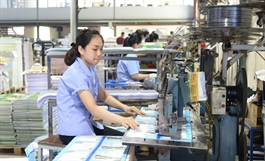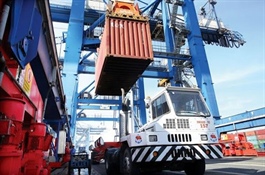Specific mechanisms and policies: additional resources for Haiphong to break through
Specific mechanisms and policies: additional resources for Haiphong to break through
At the second session of the 15th National Assembly, the northern port city of Haiphong and three other localities were approved to pilot a number of mechanisms and policies to spur development.

La Thanh Tan, deputy head of the Haiphong National Assembly Delegation, said that NA deputies have reached a complete agreement on the resolution to pilot specific mechanisms and policies for Haiphong city development. Haiphong's strategic location as the main gateway to the sea has long been affirmed, along with its important role in the growth of the Hanoi-Haiphong-Quang Ninh triangle.
The city is currently developing strongly, with high economic growth and plenty of room for development. The promulgation of a resolution on piloting specific mechanisms and policies meeting the expectations of the city's people will create opportunities and resources, promoting rapid development and creating spillover effects on regional development.
Nguyen Dinh Cung, former director of the Central Institute for Economic Management, commented that Haiphong has had a long time of development that has not really been commensurate with its enormous potential and advantages. The economic scale of Haiphong in 2020 has tripled compared to 2010, but only accounts for 3.66 per cent of the country's GDP.
One of the reasons is that Haiphong has not yet mobilised many resources to invest in socioeconomic infrastructure. The city needs to expand the development space, break administrative boundaries, open up to the whole region and the globe to take advantage of the changing trends of the current age.
Urbanisation, investment restructuring and redeployment of production forces, scientific and technological development, are emphasised. Haiphong must also consider the testing of new, outstanding, and different national institutions to pave the way for development.
Regarding the new institutional issue, the construction of a free trade zone in Haiphong city was raised. According to a report of the Ministry of Planning and Investment, no free trade zones have been implemented in Vietnam, but the model has been successfully implemented in the world, in countries like the United Arab Emirates, Singapore, and the US.
The government will direct relevant ministries and branches to coordinate with Haiphong city to craft a specific project on developing a free trade zone in the city to report to the Politburo for comments and suggestions, before submission to the National Assembly.
The application of this mechanism will help boost Haiphong's competitiveness in attracting investment and implementing large-scale projects.
In the immediate future, Haiphong has been approved by the 15th National Assembly to pilot specific policies and mechanisms on budget collection, mechanism on charge and fee collection and salary payment, among others.
Regarding financial and budgetary policies, Haiphong is now entitled to raise capital through the issuance of local government bonds, domestic loans (both financial institutions and private organisations), and from foreign loans relent by the government to the city. The total loan balance cannot exceed 60 per cent of the city's budgetary revenue as decentralised. The total annual loan amount and overspending shall be decided by the National Assembly in accordance with the Law on State Budget. Annually, the additional targeted budget for the city cannot exceed 70 per cent of the increase in central budget revenue in the area.
With the policy of fees and charges, Haiphong People's Council is entitled to apply fees and charges outside the list attached to the Law on Fees and Charges; to adjust the level or rate of the fees and charges in the above list decided by the competent authority. This particular policy does not apply to court fees and charges.
The city budget possesses 100 per cent of increased revenue from fee and change adjustment to socioeconomic infrastructure investment and other tasks.
Regarding land management, the City People's Council can decide to change the purpose of land used for growing rice with two or more crops with an area of less than 500 hectares, in accordance with zoning and land use plans decided by competent authorities.
Regarding planning management, based on the city's construction planning of functional and urban areas, the prime minister shall allow the city People's Committee to approve the adjustment of local general planning of functional and urban areas, ensuring the order and procedures regulated by the premier and report the results.
This resolution shall take effect from January 1, 2022 and will be implemented in five years.
At the meeting with local delegates in Hai An district (Haiphong) in mid-November 2021, NA Chairman Vuong Dinh Hue said that the newly-approved specific policy mechanism will help Haiphong develop vigorously and become the driving force for the region and the whole country.
From a business perspective, Nguyen Thanh Phuong, general director of Sao Do Group, noted that the application of this mechanism will help boost Haiphong's competitiveness in attracting investment and implementing large-scale projects. Businesses, especially those dealing with industrial park infrastructure such as Sao Do Group, are very responsive.
Currently, Sao Do Group is promoting the completion of the second phase of Nam Dinh Vu Industrial Park to serve the needs of secondary investors. Decentralising procedures related to land and planning will speed up project implementation. Moreover, Haiphong will have more financial resources to invest in developing the city's infrastructure, from there bolstering the city's charm in the eyes of domestic and foreign investors.
























